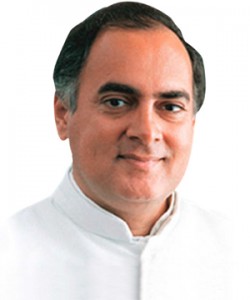Introduction
Rajiv Gandhi, an influential figure in Indian politics, left an indelible mark on the nation through his leadership, vision, and determination. This article takes a unique approach to shed light on his life, from his early years to his lasting legacy, emphasizing the key moments that shaped his journey and the profound impact he had on India.

Early Life and Education
Rajiv Gandhi’s journey began on August 20, 1944, when he was born into the illustrious Gandhi-Nehru family. Growing up amid the rich cultural and political milieu of India, he imbibed values of service and leadership from a young age. His education at prestigious institutions like The Doon School and Trinity College, Cambridge, laid the foundation for his intellectual prowess and global perspective.
Marriage and Family
In 1968, Rajiv Gandhi married Sonia Maino, an Italian student he met while studying in the United Kingdom. This cross-cultural union not only symbolized the fusion of two diverse cultures but also showcased his openness to different worldviews. Their children, Rahul and Priyanka, became integral parts of his personal journey as he navigated the complex world of politics.
Entry into Politics
Rajiv Gandhi’s entry into politics was catalyzed by the untimely demise of his younger brother, Sanjay Gandhi, in 1980. Reluctantly joining the Indian National Congress, he initially focused on grassroots work, steering clear of the political limelight. However, his destiny changed dramatically in 1984 when he was thrust into the position of Prime Minister after the tragic assassination of his mother, Prime Minister Indira Gandhi.

Outlook and Vision
As Prime Minister, Rajiv Gandhi’s vision was shaped by his commitment to modernization and technological advancement. He believed that progress in these areas was vital for India to become a global player. His forward-looking policies aimed to bridge the urban-rural divide and harness India’s intellectual potential to drive innovation.
Path to Prime Ministership
The journey to becoming the Prime Minister was not without challenges. Rajiv Gandhi’s leadership skills were put to the test as he navigated political intricacies and tried to stabilize a nation reeling from the death of its former leader Indira Gandhi. His charismatic approach and sincere dedication won him widespread support, which culminated in his appointment as the youngest Prime Minister of India.
Achievements during Prime Ministership
During his tenure as Prime Minister from 1984 to 1989, Rajiv Gandhi spearheaded several transformative initiatives. His most notable contribution was the launch of the “National Policy on Education,” which aimed to revamp the education system and promote scientific and technological research. He also played a pivotal role in enhancing India’s technological capabilities through initiatives like the “Computerization of Railways.”
Challenges Faced and Controversies
Rajiv Gandhi’s tenure was marked by both accomplishments and challenges. The Bofors scandal, a defence procurement controversy, cast a shadow on his administration. Despite the controversies, he continued to focus on economic liberalization and took steps to strengthen India’s global standing.
Legacy and Impact
Rajiv Gandhi’s legacy endures through the policies he initiated and the vision he shared. His efforts in promoting education and technology laid the groundwork for India’s subsequent advancements in these fields. Additionally, his role in empowering women through the Panchayati Raj system showcased his commitment to inclusive governance.
Murder and Lasting Legacy
Tragically, Rajiv Gandhi’s life was cut short by a terrorist attack in 1991. His assassination shook the nation, leaving a void that could never be filled. However, his legacy lived on, inspiring future leaders to continue his work in modernizing India and fostering unity in diversity.
Significant Accomplishments and Lasting Impact
Rajiv Gandhi’s tenure witnessed significant advancements in various sectors, from science and technology to education and rural development. His focus on nurturing indigenous talent and promoting innovation laid the foundation for India’s emergence as a technological hub on the global stage.
Inspirational Lessons
Rajiv Gandhi’s journey offers several inspirational lessons. His willingness to adapt, his commitment to progress, and his capacity to lead by example stand as timeless principles for aspiring leaders. His legacy underscores the potential of determined leadership in transforming a nation’s destiny.
Conclusion
In conclusion, Rajiv Gandhi’s life was a tapestry woven with dedication, innovation, and a deep love for his country. From his early years to his transformative tenure as Prime Minister, he navigated challenges and left an indelible impact on India’s growth story. His legacy continues to guide and inspire leaders to shape a better future for the nation and its people.
Clik Hear For More Biography Article
FAQ: Rajiv Gandhi’s




0 Comments